ReservationSearch and reserve rooms
Click here to confirm, change or cancel your reservation
提携法人専用予約
2025.05.01
Hakata Dontaku Port Festival: A festival that connects the locals and has continued to evolve for 800 years
EVENTS
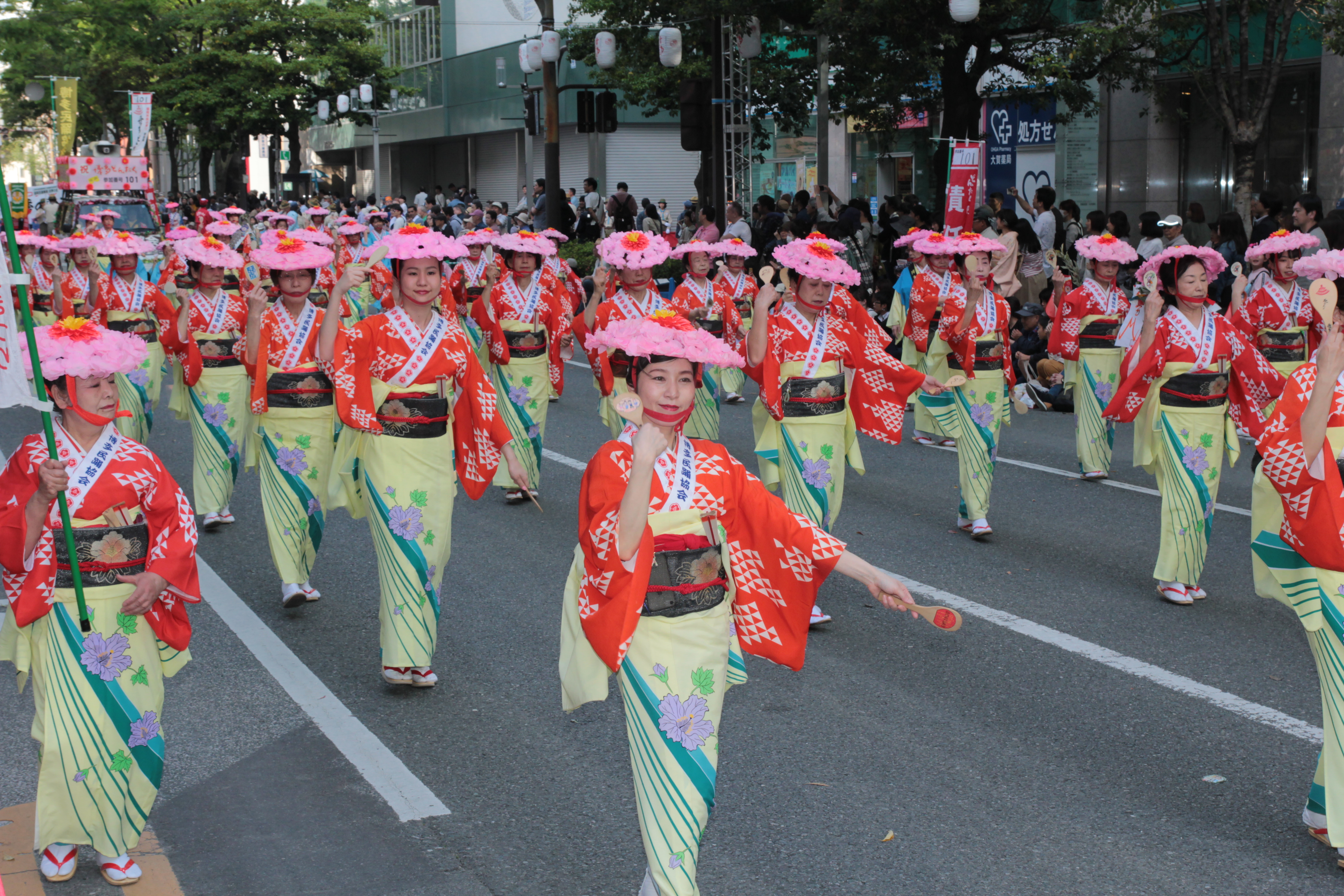
Once the cherry blossom season is over and the soft sunlight shines in, a special atmosphere flows through the city of Hakata. Every year on May 3rd and 4th, the Fukuoka citizens' festival, the Hakata Dontaku Port Festival, is held. Colorful decorations line the show windows of the shopping arcades, and the whole city is enveloped in a festive atmosphere. This year marks the 64th year of the Hakata Dontaku. Last year, the festival was blessed with sunny weather on both days, and tourist box seats were installed for the first time in five years, bringing back the prosperity that existed before COVID-19. In this article, we will unravel the charm of Hakata Dontaku.
The roots of an 800-year-old festival
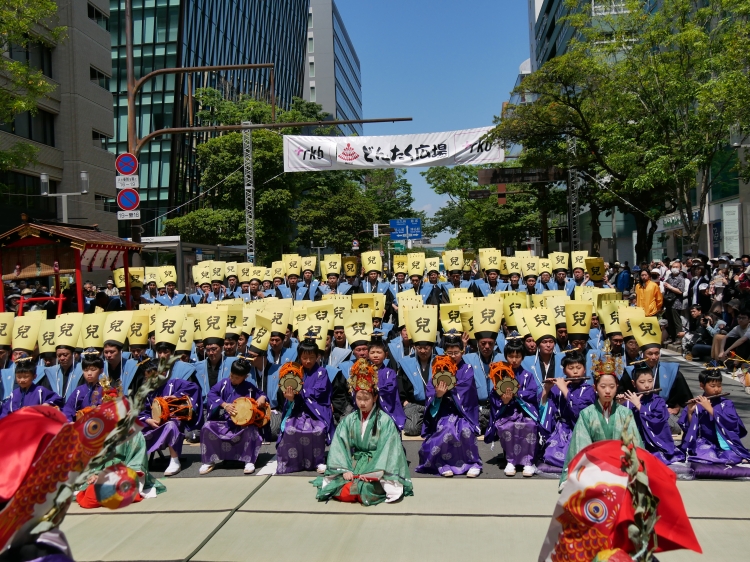
"Hakata Matsubayashi" is the root of "Hakata Dontaku"
"Dontaku" is a festival with a strange sound. The name comes from the Dutch word "Zondag" (holiday). It is said to have originated as "Matsubayashi," a matsubayashi festival performed by the people of Hakata in hopes of prosperous business and good health, and has a history of over 800 years. Currently, Matsubayashi is registered as an Important Intangible Folk Cultural Property of Japan. During the Edo period, it became an event to give New Year's greetings to the feudal lord, and since the Meiji period, it has continued as a celebratory event in which citizens can participate.
"While the form of the event changes with the times, what remains the same is the spirit of 'celebrating together.' Although it has faced the threat of cancellation at times, it has been revived each time with the help of the local citizens. Dontaku is not just a tourist event, it is the very identity of the city of Hakata," says Yoshihiro Nomaguchi of the Fukuoka Citizens' Festival Promotion Association. Hakata Dontaku is run by a small team of about 10 elite people, and Nomaguchi is almost exclusively in charge of managing and running the event during the festival period.
The city dances, and everyone becomes the star
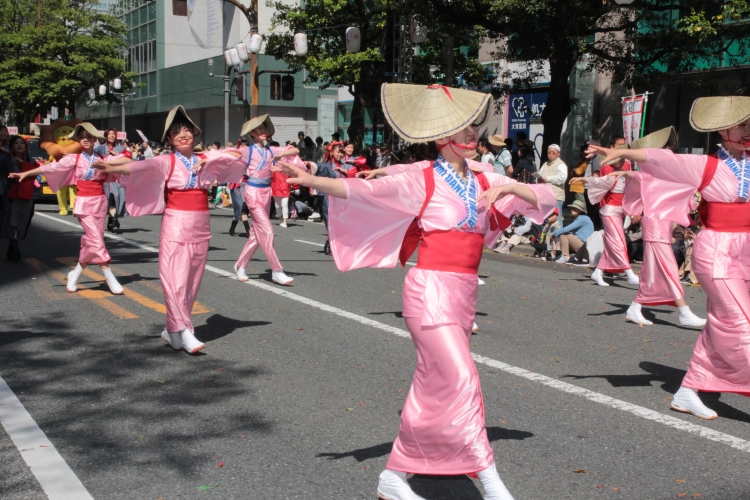
A glittering parade
On May 3rd and 4th, downtown Hakata becomes a pedestrian paradise, and special stages and performance venues appear on the main streets. The parade, in which Dontaku troupes dressed in colorful costumes march to the sound of drums and flutes, is a spectacular sight that makes it seem as if the "town is dancing."
"The parade is Dontaku's most popular event. The number of participants has increased, and in recent years it has reached about 200 groups and 18,000 people. There are various forms of marching, including singing and dancing, and there are even groups that perform using rice scoops, the symbol of Dontaku. This year, a wide variety of performers have entered, so I'm looking forward to the main event," says Nomaguchi.
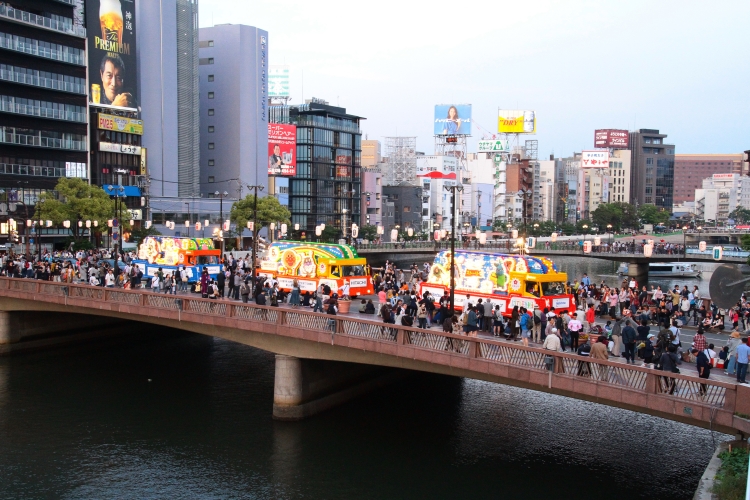
Flower car platoon passing through Nishi Ohashi Bridge
"The Dontaku parade is unique in that it is a one-way street, and the parades only move forward from start to finish. You can see far into the distance from Nishi Ohashi Bridge, which connects Nakasu and Tenjin, and near Daimaru, so you can see multiple Dontaku parades at once. The curves around ACROS Fukuoka are also impressive and a sight to behold."
One of the joys of Hakata Dontaku is that you can't just "watch" but also "participate." The parade, which you can join by registering in advance, brings together civic groups, schools, and companies, making it an event where anyone can become a star. Additionally, the So-Odori dance that marks the finale of Dontaku is an event where anyone can join in on the spot. People of all ages and genders come together and dance with smiles on their faces, giving you a sense of community unity. Over the two days, where the extraordinary and the ordinary mix together, it's as if the entire town becomes one stage in a "celebratory play."
Behind the scenes thoughts that connect the festival
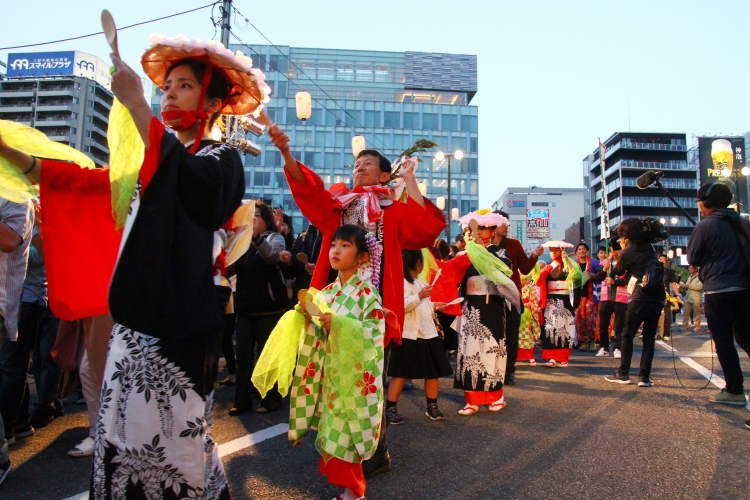
A performance using rice scoops unique to Dontaku
This festival, rich in history and tradition, is supported behind the scenes by the Fukuoka Citizens' Festival Promotion Association, local businesses, and citizen volunteers.
"The event was canceled due to the COVID-19 pandemic, and then held on a smaller scale. Last year it was finally held without any restrictions, and it felt like Dontaku had finally returned. It takes months of preparation, but there's still meaning in holding it every year as a celebratory event," Nomaguchi said seriously.
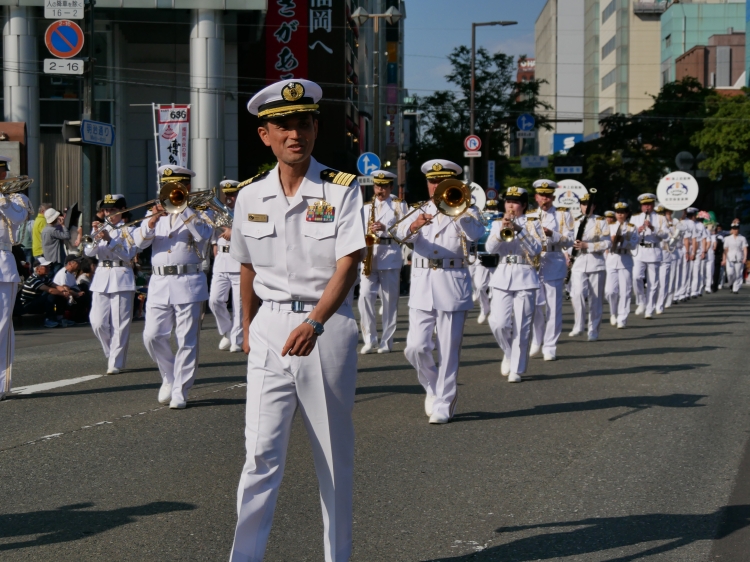
The performance by the Maritime Self-Defense Force is also worth seeing.
As it is a large-scale event held in the middle of a city, they say they face various challenges. If the weather is extremely bad they may decide to cancel the event, but if it is only light rain they will go ahead with the event. Safety is also taken into strict consideration. "We place importance on close cooperation with the police and security companies, and we give top priority to ensuring the safety of participants and spectators. We carry out various risk management measures, such as measures to prevent heatstroke and emergency responses."
He keeps on running while adjusting everything from fitting the performers' costumes and coordinating the performances to traffic regulations and safety management. He is truly the "invisible protagonist."
How to enjoy Dontaku by participating
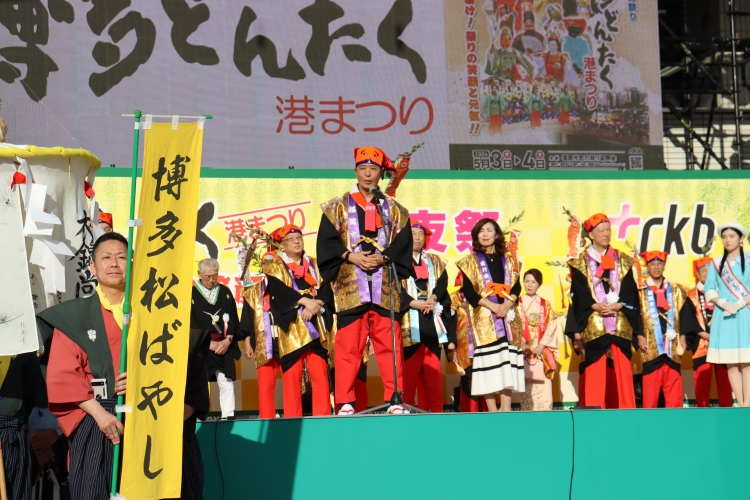
The town gets excited at the eve of the festival
The eve of the festival will be held on the main stage of the city hall in the evening of May 2nd. After the ceremony, there will be a concert featuring an artist, and this year's guest will be singer Nanase Aikawa.
"If you're visiting during Dontaku, be sure to actively participate. You can join in the general dance, or I recommend touring the performance stages while sampling Hakata specialties at the local food stalls," says Nomaguchi with a smile.
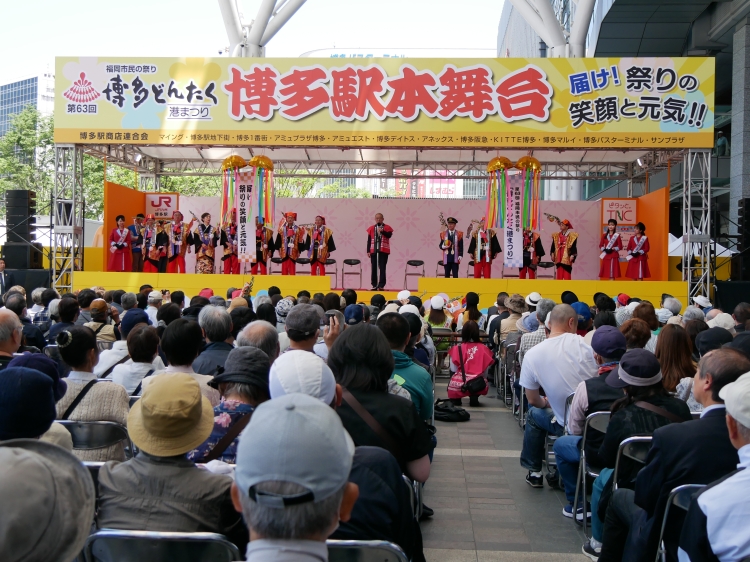
Dontaku performance venues set up throughout the city
The best part of Dontaku is how it brings you closer to the town and its people. The dancers smile and wave when you make eye contact with them, the locals kindly guide you along the way, and the sense of community that naturally arises as you dance together. It's sure to become a special memory of your trip.
The most popular venues for stage events are the main stage at Hakata Station and the main festival stage in front of City Hall. The area around Tenjin is bustling with locals and tourists, but Hakata Station also sees many visitors from outside the prefecture and abroad, creating a lively atmosphere that is unique to Dontaku season.
Let's go see the Hakata Dontaku
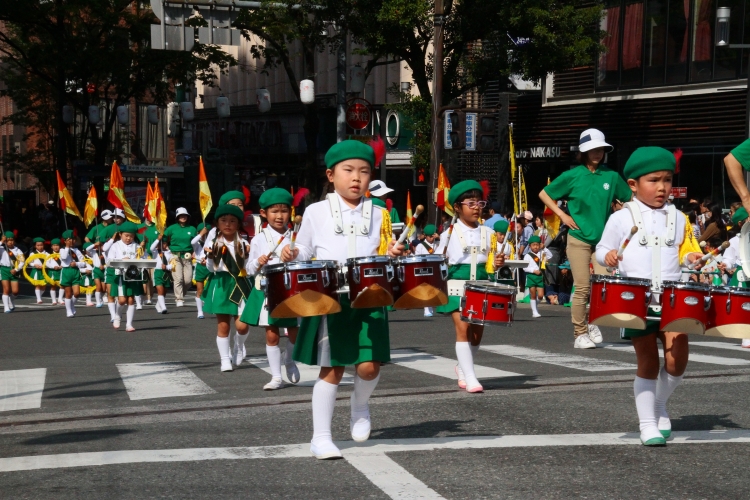
Many children also participate in the parade.
"In recent years, the number of foreign visitors has been increasing, so we would like to provide more information in foreign languages and make the festival more enjoyable and comfortable. We've also seen an increase in the number of dance groups participating, making it easier for younger generations to get involved. By spreading the word on social media, we hope to get a wider range of generations interested," Nomaguchi said, sharing his outlook for the future.
"Hakata Dontaku" is not just a tourist event, but a festival that the locals have spent a lot of time creating, and it is something to be proud of. It is a festival that continues to evolve as it combines the weight of 800 years with the breath of the people living today.
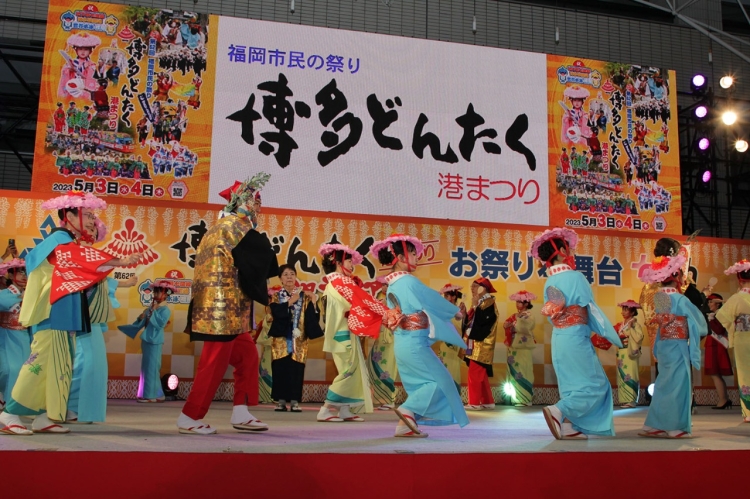
The final dance of Dontaku
"Even if people know the name Dontaku, I think there are many people who still don't know what it is about. There is a lot to see, and there are also events you can participate in and enjoy, so I hope everyone will enjoy this year's Hakata Dontaku."
This year's Golden Week, the city of Hakata will be in the midst of festive excitement.
Fukuoka Citizens' Festival Promotion Association
Phone: 092-441-1118
Address: 2-9-28 Hakataekimae, Hakata-ku, Fukuoka City, Fukuoka Prefecture (Fukuoka Chamber of Commerce and Industry, 6th floor, Regional Development Department)
Access: Tenjin to Hakata area
HP: https://www.dontaku.fukunet.or.jp/
Official social media
Instagram: https://www.instagram.com/hakata_dontaku/?hl=ja
X: https://twitter.com/HAKATA_DONTAKU
Youtube: https://www.youtube.com/channel/UCznpU474BNCzZSg5MTdW5kA
For details on opening hours and closing days, please check the link above.



